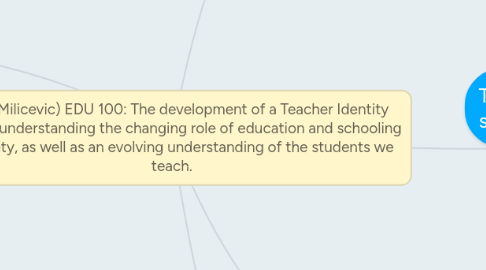
1. Conclusions
1.1. To develop a teacher identity one must understand the emergence of schooling and education, as well as its development over time to reference modern day practices and policies that determines a teacher's role in society.
1.2. An understanding of students and their various identities can aid in the formation of a teacher identity, as it will assist in the transition from student to teacher, as well as address issues in regards to communication and interaction with future students based on their diverse identities and ability to understand and digest a teacher's style of instruction and communication.
1.3. A perceived idea of what it is to be a teacher and how one should hold him/herself when engaged with their students , as well as a well thought out philosophy on education will be fundamental in fully forming a teacher identity.
2. The developing understanding of student identities and abilities.
2.1. McNie Guest Lecture: LGBTQ students, varying gender identities and sensitivity to the desired way that students wish to be perceived in regards to their sexual & gender identity.
2.1.1. Wallace, J. (2007): The inclusion of LGBTQ students and initiatives (gender-just practices) to make them feel welcome and integrated within the education system.
2.2. Picture Book Philosophy (2011): showing how students of a young age were able to perceive and identify complicated concepts such as courage and generosity.
2.2.1. Robinson (2010): The abundant presence of the ability to think divergently in children, shrinking as they go through the education system.
2.2.2. Personal Reflection: Shows that age, while it can be seen as a barrier, also may provide useful insights when approaching younger minds for their input and analysis of more complicated concepts.
2.3. Lecture and Group Discussion on March 27th: The understanding of diverse heritage, cultural or ethnic background, etcetera, while keeping in mind these diverse aspects of identity in regards to racism, prejudice and stereotypes and understanding their role in shaping a student's overall identity.
2.3.1. Personal Reflection: Becoming sensitive to these aspects of identity and understanding their role in shaping a student's overall identity can help ease communication and the student-teacher relationship. As Frank Peters stated in his guest lecture, different people learn differently and these aspects of identity may very well play a role in how students digest instruction or perceive lessons.
3. The progression and development of schooling and the impact it had on society.
3.1. Peters Guest Lecture: The cementing of bilingualism in Canada as a pillar of education, as well as the BNA act that allows provinces to create laws on education in their own jurisdiction,
3.2. Lecture and Group Discussion on April 1st: The establishment of Residential schools, their effects on the Aboriginal community and legacy to the modern day., as well as the Truth and Reconciliation Commission, which colleagues who attended mentioned did little to relieve tension and grievances held for decades.
3.2.1. Personal Reflection: Being aware of the origins of school as an institution helps to put teachers and education in perspective through the lens of the past and allows us to view both positives and negatives and learn how to move forward.
4. The role of education in society to develop and progress how we perceive the past and evaluate past decisions to in order to progress opinions and societal views in similar modern issues.
4.1. Wilson Guest Lecture & video (2014): The sterilization of people who were deemed to be "feeble-minded" and wide views held by educated individuals that this sterilization would only improve humanity, as well as the simplistic categories for different mental afflictions which were segregated by "mental-age capacities."
4.1.1. Personal Reflection: Education has had the ability to improve societal views on this concept, by increasing our knowledge in the area, we have come to realize that the simplistic categories were insufficient for a myriad of mental illnesses and mental disabilities, while the positive outlook of sterilization is now widely seen as immoral and the entire project a mistake of the past.
4.2. Lecture and Group Discussions on April 1st: The utilization of Residential schools as a strategy to assimilate aboriginals to deal with the "Indian-Problem" and eliminate their culture in order to integrate them into Canadian society.
4.2.1. Personal Reflection: While this was a strategy that was viewed positively in its time, as education and societal views developed alongside one another, the use of Residential Schools to take care of the "Indian-Problem" is widely portrayed as negative today and it was due to the embracing of multiculturalism and the realization of the poor treatment of the aboriginal children, some of which still live with the scars of those institutions today.
5. A perceived teacher identity and a philosophy of education.
5.1. Gleddie & Thomas Guest Lecture: The development of a teacher identity requiring a notion of what it is to be a teacher and a well though out philosophy that embodies a teacher's stances and views on education.
5.1.1. Personal Reflection: An influential lecture for myself that allowed me to think of myself as a teacher and about how I would organize a classroom and interact with students while maintaining a professional and respectful environment.
